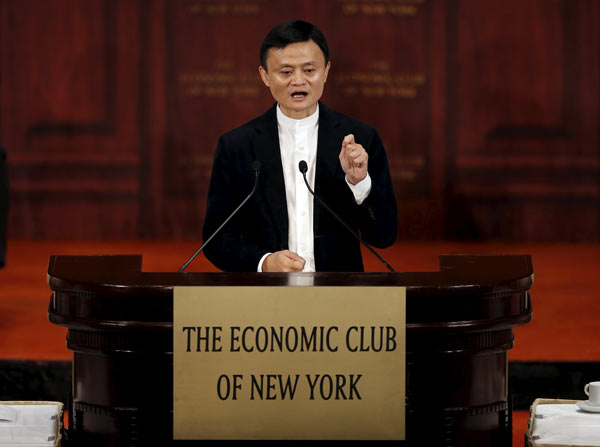Will Alibaba, Amazon clash?
Updated: 2015-07-03 11:29
By William Hennelly(China Daily)
|
||||||||
 |
|
Jack Ma, founder and executive chairman of Alibaba Group Holding Ltd addresses the Economic Club of New York at the Waldorf Astoria hotel in New York on June 9. Provided to China Daily |
Alibaba Executive Chairman Jack Ma, in a speech to the Economic Club of New York last month, said he wasn't here to challenge Amazon and other US online players, but as e-commerce becomes more global, such competition may be inevitable, William Hennelly reports from New York.
It's not about competing with US companies, it's about feeding the consumer desires of China's burgeoning middle class.
That's how Alibaba Group Holdings Ltd Executive Chairman Jack Ma spun his trip to the United States last month as he looked to drum up business for the Chinese e-commerce giant.
"My purpose coming here is we need more American products in China," Ma wrote in a June 8 op-ed for The Wall Street Journal. "We have a hungry 100 million people coming to buy every day. We did not come here to compete. We came here to bring small business."
Speaking to the Economic Club of New York on June 9, Ma said he is often asked: "What's your plan in America? When are you going to come to invade America? When are you going to compete with Amazon? When are you going to compete with eBay?
"Well, I would say we show great respect for eBay and Amazon," he said. "But, I think the opportunity and the strategy for us is helping small business in America go to China, sell their products to China."
Alibaba's Tmall and Taobao are often seen as the Chinese equivalents of Amazon and eBay, respectively. Some will likely see the US entry as a salvo into the backyard of Amazon and other American online players.
"The difference between us and Amazon is that we do not buy and sell," Ma said. "But we help small business to buy and sell. We have 10 million small businesses on our site buy and sell every day. And we do not deliver our packages, ourselves, though we have more than 2 million people help us to deliver over 30 million packages per day.
"We do not own warehouses, but we manage tens of thousands of warehouses for other small, medium-sized delivery companies," he said. "And we do not own inventories.
What you see...
"Amazon is a shopping center, you go there, you buy things you want, exactly (what) it looks like. But on Alibaba on the picture you see it looks like this, but when you buy it, it's different. People feel surprised, whoa it's different. And they love it," he said, eliciting laughs.
Ma, whose goal is $1 trillion in gross merchandise volume by the end of the decade, looks at the US move as a way to feed China's ravenous appetite for merchandise. The Chinese have a proven desire for Western - particularly American - goods.
And it's not only US business that Alibaba is after. The company announced on June 24 that 11 countries - the US, New Zealand, Australia, Switzerland, France, Britain, Spain, Singapore, Thailand, Malaysia and Turkey - now have country "pavilions" on TMall Global.
For its part, Amazon maintains websites in Australia, Brazil, Canada, China, France, Germany, India, Italy, Japan, Mexico, the Netherlands, Spain, and the United Kingdom.
Alibaba, founded in 1999, also is now the most valuable retail brand in the world, surpassing Amazon and Walmart, according to the 2015 BrandZ top 100 rankings of the most valuable brands.
With the pace of China's economic growth cooling a bit, Ma's international strategy seems logical. Overseas revenue for Alibaba represents only 2 percent of total revenue. Ma wants that number up around 40 percent.
Amazon's international operations contribute 35 percent of revenue, but only a small amount of that (about 3 percent) is from China.
What will be interesting to watch is if Alibaba does better in the US than Amazon has done in China. And with e-commerce becoming increasingly globalized, the big players likely will meet on the cyber battlefield someday, despite the competition angle being downplayed.
"Amazon in China seems to be focused on bringing Western brands over to China as well, so there will definitely be competition," Scot Wingo, executive chairman of e-commerce software firm Channel Advisor, told China Daily. "I do think that as part of their long-term plan, Alibaba will open a directly competing marketplace in the US, just probably not in the near future."
"Alibaba's rates are very competitive, which should allow many more retailers to get on the platform," Gil Lauria, a technology analyst with Wedbush Securities in Los Angeles, e-mailed China Daily.
"US sellers that have a direct business in China will be able to supplement that business by selling on Alibaba's Tmall," he said.
Some recent news, however, shows that Alibaba could face difficulty when it operates in the US, as Alibaba announced that it would sell its US website 11 Main to rival OpenSky. 11 Main did not go over well with merchants.
Alibaba will keep a stake in the combined entity. Alibaba last year started 11 Main, perceived as a shop window for small US sellers and an alternative to Amazon and eBay.
"Inspired by the shopping experience found on Main Streets across America, 11 Main is a new online destination for specialty shops and boutiques" its website says.
"It is a mish-mash of Etsy, Amazon and whatever and whoever wants to sell," Joel Young, who sells iPhone cases and docking stations, told Bloomberg. "11 Main thought they could come in with big money and disrupt. Boy, were they wrong."
But Ma has said he always looks five years into the future, so Alibaba likely will be patient in the US.
"I think it will be successful over the long run," said Wingo, who added that small businesses "are very interested in selling into China, but need more help with the logistics, tariffs and other complexities". (ChannelAdvisor partners with Tmall Global, which helps import products to China.)
"It will take a while to put all of this together for SMBs (small-to-medium businesses), but in 18-24 months, I think it will be much more common for US SMBs to sell into China via Alibaba," Wingo said.
- Injured ROK tourists in intensive care
- 36 dead, 26 missing after banca capsized in C. Philippines
- Thai navy plans to buy three Chinese subs
- Mass casualties in Indonesian military plane crash
- Japan's LDP lawmaker denounces Abe's security policies
- More than 100 feared dead in Indonesian military plane crash

 Across America over the week (June 26-July 2)
Across America over the week (June 26-July 2)
 Solar-powered plane breaks solo flight record
Solar-powered plane breaks solo flight record
 A soap maker's fragrant life
A soap maker's fragrant life
 Ten photos you don't wanna miss - July 3
Ten photos you don't wanna miss - July 3
 Cooling off to escape the heat wave
Cooling off to escape the heat wave
 Top 10 best hotel booking apps for Android
Top 10 best hotel booking apps for Android
 Western Europe swelters in long-lasting heat wave
Western Europe swelters in long-lasting heat wave
 Top 10 shareholders of AIIB
Top 10 shareholders of AIIB
Most Viewed
Editor's Picks

|

|

|

|

|

|
Today's Top News
Will Alibaba, Amazon clash?
China-France ties 'benefit all'
Veteran diplomat in Havana shortlisted for ambassador
Solar-powered plane breaks solo flight record
California mulls move to 'zero-emission buses'
Move to Houston pays off with new business
IPR law acted out
Economic growth driving force for China's future mobility: Think tank
US Weekly

|

|






